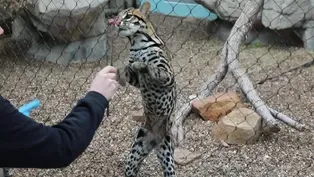
Sports betting surge leads to harassment of college athletes
Clip: 4/6/2025 | 6m 6sVideo has Closed Captions
Sports betting surge leads to rise in online harassment of elite college athletes
According to an American Gaming Association estimate, more than $3 billion will have been bet on this year’s March Madness tournaments — more than February’s Super Bowl. The NCAA says that’s led to a distressing consequence: online abuse of players, coaches and officials by losing bettors. John Yang speaks with sports psychologist Brett Woods to learn more.
Problems with Closed Captions? Closed Captioning Feedback
Problems with Closed Captions? Closed Captioning Feedback
Major corporate funding for the PBS News Hour is provided by BDO, BNSF, Consumer Cellular, American Cruise Lines, and Raymond James. Funding for the PBS NewsHour Weekend is provided by...

Sports betting surge leads to harassment of college athletes
Clip: 4/6/2025 | 6m 6sVideo has Closed Captions
According to an American Gaming Association estimate, more than $3 billion will have been bet on this year’s March Madness tournaments — more than February’s Super Bowl. The NCAA says that’s led to a distressing consequence: online abuse of players, coaches and officials by losing bettors. John Yang speaks with sports psychologist Brett Woods to learn more.
Problems with Closed Captions? Closed Captioning Feedback
How to Watch PBS News Hour
PBS News Hour is available to stream on pbs.org and the free PBS App, available on iPhone, Apple TV, Android TV, Android smartphones, Amazon Fire TV, Amazon Fire Tablet, Roku, Samsung Smart TV, and Vizio.
Providing Support for PBS.org
Learn Moreabout PBS online sponsorshipJOHN YANG: A good number of those watching today's NCAA women's basketball championship and tomorrow's men's championship will have some money riding on the outcomes.
According to an American Gaming association estimate, more than $3 billion will have been bet on this year's tournaments.
That's more than February's Super Bowl.
The NCAA says that's led to a distressing consequence, online abuse of players, coaches and officials from losing bettors.
It's so bad that the NCAA has launched a social media and commercial campaign.
MAN: Root for your team, get crazy when the buzzer sounds, but don't harass anyone because you lost the bet.
It's time we draw the line and put an end to the abuse.
JOHN YANG: The NCAA says they're concerned about the mental well-being of student athletes.
Brett Woods is a sports psychologist with the University of Kansas Health System.
Brett, last night, a big upset.
Houston, big comeback to beat Duke.
Is this the sort of game that's likely to trigger a lot of these angry betters to reach out to the athletes, to the players?
BRETT WOODS, The University of Kansas Health System: Yeah, on a number of levels.
One, when you look at it being a semifinal Final Four game, the intensity of what's at stake, how many fans are watching, and then when you think about how close the game was, I think with a minute and 13 left in the game, if you're a Duke fan, I think you're riding high because you had 80 plus percent odds by the analytics that you're going to win that game.
And then Houston comes back and makes a few key plays offensively, defensively, those odds swing in their favor.
So you've got that adrenaline rush in the final moments of a game.
So this is kind of one of those situations that I think is ripe for people to feel a lot of that adrenaline rush and maybe make some commentary towards players after the game.
JOHN YANG: And these players already have a lot of pressure on them.
The performance on the playing field, the court, the arena, also the pressure performance of the classroom.
What does this additional pressure from people who've lost a bet and may be angry.
What does this do to their mental well being?
BRETT WOODS: Well, I think one and I really appreciate the NCAA coming forward with the Draw the Line campaign.
What you're starting to see, you know, in the last 5, 10, 15 years with the increase in social media is it's having a very big impact on our student athletes mental health and well-being.
So some of the things that I like to educate the athletes that I work with is that how much you're using social media can of course affect your mental well-being.
So when we get to about that three-hour mark or more, we see rates of anxiety, depression going up, we see that alienation from self and others kind of going up.
So you have that the influence of social media on top of fans who have a vested interest financially and the outcomes of games I think being ripe for affecting the kind of mental health and well-being of our student athletes.
You have fans now reaching out in ways and platforms that didn't exist five, 10 years ago through Instagram and Twitter or X and other kind of social media platforms.
And because of what they have on the line.
It's one thing when we're dressing in our team gear and we're celebrating, we're excited.
But then when you put money on the line, it goes beyond ego, then it goes into other forms of risk and reward.
And so when those bettors, when they lose that money, it activates that part of our brain or body that puts us in threat and we're more likely to be harassing or saying and doing things that we wouldn't typically say and do in our normal lives.
So, one of the terms that we have in the world of psychology is the idea of bracketed morality.
That idea of in sport context, when money's on the line, we suspend our moral beliefs and our values and we may for all intents and purposes be good and decent people a majority of the time.
But in these types of contexts, people say and do things that they typically wouldn't because they've lost something and they get into that threat mode.
JOHN YANG: The NCAA says that women athletes get three times the abuse as male athletes during March Madness.
What does that additional pressure do on female athletes?
BRETT WOODS: I think when we look at the female student athlete, they have additional pressures and stresses that sometimes the male student athlete faces.
And I'm a part at the University of Kansas, the female athlete program.
And one of the things that we talk about is just the holistic aspect of it in terms of when you think about body image and self-esteem, when you think about just the added pressures that exist for student athletes, female student athletes, you add in this layer of money on the line.
And I think student athletes, especially female student athletes, have additional pressures that we're seeing above and beyond their male counterparts.
JOHN YANG: You're dealing with the targets of this abuse.
What message would you have for the people who were sending this out, who were losing bets and getting angry?
BRETT WOODS: I think that's a great question because I think we have to appeal to shared humanity.
The example that I like to give is I want you to imagine that your worst day at school, at work, and I want you to imagine what that felt like.
And probably a very small proportion of people know about that worst day.
Well, I want you to zoom out and imagine now that tens of millions of people now know that about that worst day.
Right.
And they're criticizing, critiquing you for every decision that you made.
They're harassing you and telling you that you're no good.
And that's kind of a nice way of putting it.
Some of the student athletes that are facing way worse kind of abuse and harassment than that.
But I want you to imagine that worst day of yours and all the feelings that came along with it.
And I want you to imagine receiving all that critique and all that hate probably going to make you feel a certain way.
Right.
So I think we need to appeal to that shared humanity.
Take a step back and recognize that what took you maybe 5, 10 seconds to type is going to have a compounding effect on the health and well-being of our student athletes.
JOHN YANG: Brett woods from the University of Kansas Health System, thank you very much.
BRETT WOODS: Thank you.
Military creates artificial reefs to protect U.S. shorelines
Video has Closed Captions
Why the military is creating artificial reefs to protect U.S. shorelines (5m 26s)
News Wrap: IDF changes its account of killing of Gaza medics
Video has Closed Captions
News Wrap: Israeli military changes its account of killing of 15 medics in Gaza (2m 42s)
Scientists work to save ocelots with fertility treatments
Video has Closed Captions
Scientists work to restore wild ocelot populations with fertility treatments (2m 54s)
What to know about Trump’s tariffs and globalization
Video has Closed Captions
What to know about the effect of Trump’s tariffs on globalization (5m 31s)
Providing Support for PBS.org
Learn Moreabout PBS online sponsorshipSupport for PBS provided by:
Major corporate funding for the PBS News Hour is provided by BDO, BNSF, Consumer Cellular, American Cruise Lines, and Raymond James. Funding for the PBS NewsHour Weekend is provided by...















